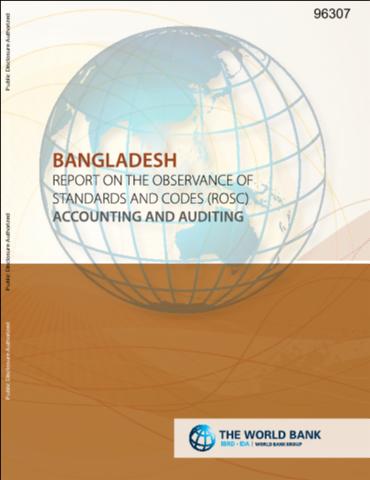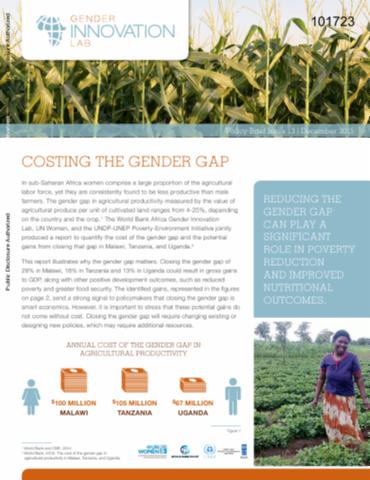The World Bank is a vital source of financial and technical assistance to developing countries around the world. We are not a bank in the ordinary sense but a unique partnership to reduce poverty and support development. The World Bank Group has two ambitious goals: End extreme poverty within a generation and boost shared prosperity.
- To end extreme poverty, the Bank's goal is to decrease the percentage of people living on less than $1.25 a day to no more than 3% by 2030.
- To promote shared prosperity, the goal is to promote income growth of the bottom 40% of the population in each country.
The World Bank Group comprises five institutions managed by their member countries.
The World Bank Group and Land: Working to protect the rights of existing land users and to help secure benefits for smallholder farmers
The World Bank (IBRD and IDA) interacts primarily with governments to increase agricultural productivity, strengthen land tenure policies and improve land governance. More than 90% of the World Bank’s agriculture portfolio focuses on the productivity and access to markets by small holder farmers. Ten percent of our projects focus on the governance of land tenure.
Similarly, investments by the International Finance Corporation (IFC), the World Bank Group’s private sector arm, including those in larger scale enterprises, overwhelmingly support smallholder farmers through improved access to finance, inputs and markets, and as direct suppliers. IFC invests in environmentally and socially sustainable private enterprises in all parts of the value chain (inputs such as irrigation and fertilizers, primary production, processing, transport and storage, traders, and risk management facilities including weather/crop insurance, warehouse financing, etc
For more information, visit the World Bank Group and land and food security (https://www.worldbank.org/en/topic/agriculture/brief/land-and-food-security1
Resources
Displaying 576 - 580 of 4906Bangladesh Report on the Observance of Standards and Codes
The Report on the Observance of Standards and Codes - Accounting and Auditing (ROSC A&A) program is part of a 12-module joint World Bank-IMF initiative to assist member countries to strengthen their financial systems by improving their capacity to comply with internationally recognized standards and codes. The ROSC A&A program focuses on the institutional framework underpinning national accounting and auditing practices, and degree of conformity with international standards and good practices.
Costing the Gender Gap
In sub-Saharan Africa women comprise a large proportion of the agricultural labor force, yet they are consistently found to be less productive than male farmers. The gender gap in agricultural productivity-measured by the value of agricultural produce per unit of cultivated land-ranges from 4-25 percent, depending on the country and the crop.1 The World Bank Africa Gender Innovation Lab, UN Women, and the UNDP-UNEP Poverty-Environment Initiative jointly produced a report to quantify the cost of the gender gap and the potential gains from closing that gap in Malawi, Tanzania, and Uganda.
Confronting complexity : using action-research to build voice, accountability, and justice in Nairobi's Mukuru informal settlements
The Constitution of Kenya (2010) has provided the means for confronting new challenges to evictions and access to justice faced by vulnerable groups such as the residents of Mukuru. New jurisprudence has begun to emerge, addressing the human rights implications of evictions. Project researchers along with the Katiba Institute and Strathmore University’s School of Law work closely with the community to investigate different existing tenure arrangements in Mukuru to determine how the Constitution and land laws can be used to address challenges related to insecure land tenure.
Uganda Systematic Country Diagnostic
After a destructive civil war and
extreme political instability, Uganda began its
reconstruction process in 1987. Within the enabling
environment of macroeconomic stability, most of the progress
on the twin goals was attributable to higher agricultural
incomes. Poverty reduction among households primarily
engaged in agriculture accounted for 53 percent of the
reduction in poverty from 2006 to 2010 and 77 percent of the
Country Partnership Framework the Arab Republic of Egypt for the Period FY2015-2019
The World Bank Group (WBG) Country
Partnership Framework (CPF) for Egypt forFY15-19 has been
prepared at an important juncture in Egypt’s history to
support transformational changes to the economic and social
space. It builds on the Government of Egypt’s (GOE)
medium-term strategy and national priorities for economic
development, responds to client demands, and is informed by
consultations with a broad array of stakeholders in Egypt.









